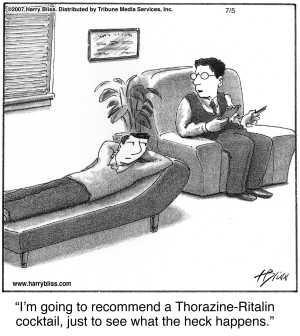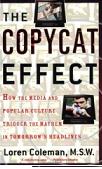Politics
Election 2008
Remember the good old days of 2004? When political debate was suitable for yelling out open car windows? "Bush lied! And he's a cowboy!" "Kerry flip flops! And he's French!" That was awesome.
This time around, instead of repeating empty, meaningless soundbites that we steal from various media sources, let's dispense with the pretense that we thought anything through, and simply yell out the sources themselves.
"CNBC at 12:30 Tuesday. I don't remember most of it, but he got it from Rush Limbaugh."
"That's stupid, because I caught the last nine seconds of a contrasting position on Lou Dobbs at 8p on Wednesday. That's prime time."
"My friend said XM said that All Things Considered said Dobbs was a fool, and ATC is certainly more intellectual than the show you didn't watch, so I am ahead."
He boots up his Mac. "Except The New Yorker had a three page story on the election that I therefore didn't need to read, so I own you."
"Oh, please, the friggin New Yorker. I read Daily Kos."
"The Daily Kos can blow me."
Pause.
"That's it?"
"Just saying." He orders another decaf mocha. "Besides, Time said bloggers are monkeys with one hand down their pants."
"The crawl on CNN said Time readership is down, and masturbating primates have determined six of the last three elections. The crawl is where all the good stuff is."
"You wish. That crawl is as compelling as a Soulja Boy acoustic set. Besides, the anchor at CBS made fun of CNN. Anchor beats crawl."
"But didn't the CBS anchor steal his quotes from CNBC?"
"Yes, who in turn quoted Rush--"
"--who was responding to something from The Daily Show!" He tears open a Splenda. "Wait, does all political discourse in this country originate with Rush Limbaugh and Jon Stewart?"
"Sadly, yes."
Pause. He googles Juno and iphone.
"I wonder why that is?'

 Score: 5 (5 votes cast)
Score: 5 (5 votes cast)
Update on Schering Plough

Technically, it was only 18%, but I'll take it. Sold today. Likely goes to 20, but I only bought it to prove a point: doctors, especially in committees, cannot be trusted with their own data, and politics always wins over science. I was able to make money on the politics, but what about the patients who are pawns in this game, who think they're getting "evidence based" care?
Good luck, everyone. You'll need it.

 Score: 0 (0 votes cast)
Score: 0 (0 votes cast)
Time Magazine Stays Out Of the Election
Look at the page for three seconds only. Guess which party Time favors?
Continue reading:
"Time Magazine Stays Out Of the Election" ››

 Score: 0 (0 votes cast)
Score: 0 (0 votes cast)
Eliot Spitzer and Alexandra Dupre: Don't Choose The Red Pill
What color bikini does Alexandra Dupre have? That's right, you're a pawn.
Continue reading:
"Eliot Spitzer and Alexandra Dupre: Don't Choose The Red Pill" ››

 Score: 2 (2 votes cast)
Score: 2 (2 votes cast)
An Observation About The Current Election
I can't believe that with all the anger most Democrats have against George Bush, they are this-- apathetic. Four years the Democrats had, to find and build the perfect candidate. To organize as a party and say, "never again!" and build a careful platform, encourage cohesion, work to bring in disgruntled Republicans...
Instead, they defaulted to Clinton, barely half-heartedly, leaving plenty of room for Obama to try. A young, never tested Senator-- there should have been no way he could have entered the race, let alone won. Not because he's not good-- but because, by now, the Democrats should have already decided who they wanted.
It's a lack of organization and commitment which will, unfortunately, lead to a loss in 2008.
I'd tell you this applies equally to Republicans-- it does. The difference is that this election, since at least 2006, was going to go to the Democrats. Republicans should have been preparing for 2012, or the Senate. But now...
Don't flame me. I'm not making a comment on the candidates' abilities, just on how the system should have worked, but failed. And the reason it failed is the same reason we're in a recession: lack of organization, and lack of commitment.

 Score: 0 (0 votes cast)
Score: 0 (0 votes cast)
A Study Finds Antidepressants Don't Work, And Suddenly It's October 25
ABC News, and others, report that the NEJM study found that antidepressants "may be duds."
Climb on the bandwagon, my bolsheviks, no brakes, no driver, let us see where it takes us.
Continue reading:
"A Study Finds Antidepressants Don't Work, And Suddenly It's October 25" ››

 Score: 0 (0 votes cast)
Score: 0 (0 votes cast)
Do Narcissists Get Abortions?
One Of These Things Is A Straw Man, And The Other Is On Fire

Daniel Carlat, of the Carlat Report, has an article in the New York Times Magazine. It's six pages long, and decidedly anti-Pharma. But Daniel Carlat isn't from New York-- so why would he have an article published there?
You say: well, where he's from has nothing to do with it, the New York Times is publishing it because of what he says.
Exactly.
His article, well written and persuasive, stands as is, undisputed because there is no forum in which to dispute it. I guess it would be nice if the Times would allow me to write an op-ed-- you know, in op to the ed-- but I guess this blog will have to do.
Carlat is wrong, very wrong, not because he is factually incorrect about his target, but because his target is a straw man. The problem isn't Pharma. It's doctors.
Continue reading:
"One Of These Things Is A Straw Man, And The Other Is On Fire" ››

 Score: 4 (4 votes cast)
Score: 4 (4 votes cast)
Which Is Worse: An Altered Photo of Reality, Or A Photo That Alters Reality?

On the left is real 1989 Tiananmen Square. On the right, a doctored photo. 300 people were shown either a real or altered photo of two different protests, and then asked to recall what happened back then. The point of this study was to show that altering a photograph will change how the events are actually remembered (in this case, as bigger and more violent.) It's important to emphasize that the subjects already had a memory of the events (from TV, etc)-- so this photo actually changed their pre-existing memories, and they weren't aware of it.
Continue reading:
"Which Is Worse: An Altered Photo of Reality, Or A Photo That Alters Reality?" ››

 Score: 9 (11 votes cast)
Score: 9 (11 votes cast)
Presidential Anti-Pharma Rhetoric Heats Up
So once again I’m in the weird position of having to defend something I’m actually against.
Continue reading:
"Presidential Anti-Pharma Rhetoric Heats Up" ››

 Score: 1 (1 votes cast)
Score: 1 (1 votes cast)
What Hath Google Wrought
The quote, "what hath God wrought" comes from Numbers 23:23, about the Israelites, but it was popularized by Samuel Morse when he sent it as the first message over the telegraph.
I've been telling everyone who will listen to buy Google-- it's up 140 points since I wrote about it a month ago-- because it is more than an investment, it is a paradigm shift.
Continue reading:
"What Hath Google Wrought" ››

 Score: 7 (7 votes cast)
Score: 7 (7 votes cast)
This Is Just a Joke, Really, No, Really, It's Not Real, We're Much More Rigorous Than This, I Said It's A Joke, Okay? Let It Go!
Continue reading:
"This Is Just a Joke, Really, No, Really, It's Not Real, We're Much More Rigorous Than This, I Said It's A Joke, Okay? Let It Go!" ››

 Score: 3 (3 votes cast)
Score: 3 (3 votes cast)
So Doctors Are Allowed To Breast Feed
A ridiculous story about a female medical student needing to go to appeals court to get extra time during the medical licensing exam so she could breast feed her kid.
Here's why it's ridiculous. If she had ADHD-- which does not exist as a physical entity but is considered an illness-- then she could get extra time. But because it's a baby-- which does exist, but is not considered an illness-- then she is entitled to nothing.
Continue reading:
"So Doctors Are Allowed To Breast Feed" ››

 Score: 4 (4 votes cast)
Score: 4 (4 votes cast)
Why I Am Against Mental Health Parity
Continue reading:
"Why I Am Against Mental Health Parity" ››

 Score: 1 (1 votes cast)
Score: 1 (1 votes cast)
When I Said Doctors Were Too Involved In Social Policy, This Isn't Exactly What I Meant
"Seven of the eight people arrested are doctors or medical students..."
No psychiatrists, but it's only Tuesday.

 Score: 1 (1 votes cast)
Score: 1 (1 votes cast)
Damned If You Do... No, That's All. Damned If You Do.
In case there was any doubt that psychiatry is on the march (from Psychiatric Times June 2007):
The mass murders at Virginia Tech [sic: there was only one mass murder] could lead to harsher laws restricting [mentally ill people's] rights... Perlin, professor of law at NYU, predicted that several states will try to change the basis for involuntary commitment from danger of harm to self and/or others to the need for psychiatric treatment. [emphasis mine, but really, does it need emphasis?]
Mr. Perlin said he expects the U.S. Supreme Court will be asked to rule on such a statute's constitutionality within 10 years. "I am already counting the votes."
Me, too: Scalia, Thomas, Roberts, Alito, Ginsburg-- strange bedfellows, indeed, but Scalia and Ginsburg spend every New Year's Eve together-- against; Souter, Kennedy for; the rest is anyone's guess (Stevens may not even be there.)
The second article, from the same issue, accidentally describes the crux of the psychiatry/violence dichotomy. In "Mental Health Staff Can't Sue If Injured By Patient," the writer explains how it is rare, and generally discouraged, for staff to sue or press charges against a patient who is violent and injures them.
Patients who attack mental health professionals in hospital settings are rarely prosecuted and usually cannot be sued for civil damages [said] Ralph Slovenko, Ph.D. at the annual meeting of the American College of Forensic Psychiatry.
...Authorities usually take the position that it would be inconsistent to prosecute a person who has already been hospitalized for reason of mental illness...
... a New Jersey Court ruled [that] to convict a mentally ill person for displaying symptoms of mental illness... could not be justified constitutionally or morally.
Anyone disagree? Choose carefully. Here's the problem: the exemption from prosecution isn't for the insane behaving insanely, or the schizophrenic exhibiting psychosis; the exemption is for any patient. "Patient" in this context, is defined as anyone who is in the psychiatric hospital. In other words, it's not a label based on pathology; it's a label based on geography.
This may surprise many people, but psychiatrists hospitalize non-mentally ill people all the time. Any resident will lament how often they are confronted with the malingering drug user who fakes suicidality to gain admission. Well, if you admit him-- strike that, if he has ever been admitted-- then he is a de facto patient. If he kills you, he is automatically in a different legal status than if he murdered you in a supermarket. For example: no death penalty.
It goes without saying, of course, that even the presence of mental illness shouldn't free one from prosecution. That's why we have the legal construct of insanity.
Here's the clincher:
The situation is analogous to the "Fireman's Rule" in tort law, he said. A firefighter... cannot sue the owner of a burning building for injuries sustained in firefighting.
... I assume because a firefighter must have a reasonable expectation of fire-related danger. Fine. But if the firefighter, while fighting the fire, gets shot in the face by one of the meth-lab workers inside that the owner of the building is employing to make methamphetamine, is there no basis for a suit? Does reasonable expectation of a certain level of danger extend to, well, to volitional acts of violence that have nothing to do with the physical structure that the violence happens in?
The reason I mention these two articles together is because they are the same. "Mental illness" is a term so vague and empty that it is dangerously useless. Reducing one's responsibility, or restricting their freedom, based on such an arbitrary term is, well, insane. Doing both at the same time is a tacit acceptance of classism; that some have the responsibility to rule, and some have the responsibility to be ruled.
Oh, I know: everyone hates George Bush because he has no respect for civil liberties. Ok.

 Score: 4 (4 votes cast)
Score: 4 (4 votes cast)
Dr. Nasrallah Asks Questions That No One, Including He, Wants Answered
But I'm going to try.
His editorial appears in the journal Current Psychiatry, of which he is the editor. I respectfully disagree.
Continue reading:
"Dr. Nasrallah Asks Questions That No One, Including He, Wants Answered" ››

 Score: 1 (1 votes cast)
Score: 1 (1 votes cast)
FTAC: Forensics Gone Awry, And I told You So
Following from my premise that the erosion of civil liberties and descent into fedualism necessarily coincides with the rise of psychiatry, I found a short article in the Economist, the magazine of record of the Whig Party, which explains that British Government runs a "Fixated Threat Assessment Centre," i.e. capturing stalkers. It has 4 cops, and a forensic psychiatrist and psychologist.
You probably think that the shrinks are "profilers." Maybe they are. But their real value is in their power to do what cops can't: involuntarily commit people who they feel are dangerous. Quoting the Economist:
The Met [cops] defines its [suspects] as those who are "abnormally preoccupied with certain ideas or people." The inclusion of "ideas" gives it wide remit. Could those abnormally pre-occupied with the idea of jihad-- or, indeed, human rights-- be considered fixated individuals?
Disclosure: I actually think this is clever-- why not tap the legal resources of psychiatrists to help catch bad guys? But that's exactly the point: no one should have the ability to use that power extra-psychiatrically. It's seductive and it has no recourse for appeal, no controls.
The article goes on to state the FTAC has been operating for 8 months with no official announcement; it won't say how many people it has caught or tried; and, of course, it can't, because of confidentiality of the "patients."
Good luck, everybody.

 Score: 3 (3 votes cast)
Score: 3 (3 votes cast)
Paris Hilton or Mary Winkler? Forensics Gone Awry
I'll take Paris any day.
So Paris goes back to jail after the behind the scenes/cover of darkness/MK-ULTRA deal she made to get out of jail early was met by the public with consternation.
As near as I can tell, a/her private psychiatrist (his blog here-- mine's better, dammit) visited her for two hours in jail, then made a plea to the sheriff that serving her sentence in jail was psychiatrically harmful to her. So they let her out to serve it at home.
The argument here, of course, is that this is rich-white-girl gets special treatment; and the easiest way to do it is to use psychiatry. And people say, "see? This is they type of abuse we can expect if psychiatry is allowed to influence legal matters."
Fair enough. I don't know Hilton's case, whether it was a appropriate or not, I don't know Dr. Sophy; all I can say is, yes, the potential for abuse exists, but perhaps it is balanced out by the cases in which it is helpful to society.
But consider the reverse situation, and read it carefully because then I'm going to punch someone:
SELMER, Tennessee (AP) -- A woman who killed her preacher husband with a shotgun blast to the back as he lay in bed was sentenced Friday to three years in prison, but she may end up serving only 60 days in a mental hospital.
Mary Winkler must serve 210 days of her sentence before she can be released on probation, but she gets credit for the five months she has already spent in jail, Judge Weber McCraw said.
That leaves only two months, and McCraw said up to 60 days of the sentence could be served in a facility where she could receive mental health treatment. That means Winkler may not serve any significant time in prison.
Same gripe: look how people use psychiatry to manipulate the legal system-- "only two months for killing someone?!" and while I agree that's pretty pathetic, what's worrying me is this: who the hell spends five months in jail without getting a trial?
This probably didn't occur to you, and that's why it still happens. If I kill my preacher husband, I have the right to a speedy trial. If I can't get a speedy trial, I get to pay a fee to be released, and then show up in court when the government gets their act together. But what if I don't have bail money? How can the courts justify indefinite incarceration in the absence of a trial?
Enter psychiatry. You get a psychiatrist to evaluate the person and determine that he is not competent to stand trial. They recommend 60 days involuntary commitment/treatment in a psych hospital in order to "restore them to competency." If at the end of 60 days the evaluator comes back, and if he still thinks they're not competent-- they get (re)committed again. Etc.
But in the vast majority of cases I have been involved in, the report really only reflects the presence of a mental illness, not its impact to the case. As if it is de facto proof of incompetency. It's not.
But here's the move: the "psych hospital" they get involuntarily committed to is actually their cell.
Technically, they are supposed to be committed to an inpatient hospital. Many jails have them on the premises. But if the commitment is for 60 days, and the psychiatrist treating them (i.e. not the evaluator) thinks they are cured, then they get sent back into population (their cell). Maybe they continue on medication; maybe they see the psychiatrist weekly for "outpatient" visits.
Or maybe, maybe, the treating psychiatrist doesn't think they need any treatment. So they spend their commitment in exactly the place they started.
Worse, much worse, is how many people I see that I say are competent and still wind up recommitted for two months. Six months. A year. Think I'm kidding? It is impossible to even estimate how many charts I have read that indicate no psychiatric contact-- not medication, not therapy, not psychiatrist-- for the entire duration of their commitment. And why should there be? The treating psychiatrist doesn't see anything to treat.
You're probably thinking about murderers and rapists; but the majority of these cases are theft, assaults, drug possessions. Can anyone explain to me what possible justification exists for locking up a guy charged with possession for eight months, no trial? And I'll pretend the guy is whacked out of his nut psychotic. Ok? Any justification at all?
I'm not saying you can't sentence him to eight months-- cane him, for all I care; I'm saying you can't jail him for eight months without a trial. Is anyone listening to me?
The system is designed with simply one outcome in mind: keep the poor with high recidivism rates and minimal social resources in jail-- a sort of half-way house for the disenfranchised-- until you can't possibly justify it any longer, and then give them a quick trial, accept the guilty plea ("what guilty plea?") and sentence them to time served and probation-- where you can add further controls.
It's debatable whether keeping potential terrorists in Cuba is a good idea. But when the State starts using pyschiatry to manage their population...
I know you think I am exaggerrating. I'll bet you're not poor.

 Score: 7 (7 votes cast)
Score: 7 (7 votes cast)
"The Copycat Effect:" Does Reporting Violence Lead To Violence?
A reader asked me to read his book before saying that copycat suicides is not a real phenomenon.
To be fair, his book is really good. It is worth the price even as a reference guide/catalog of suicides and homicides that share similar characteristics, which are striking. While the majority of the information is a google search away, the fact is that he actually did the searches. It's also a good read-- it neither bores you nor crams the conclusions into your head.
But, I respectfully disagree. I think.
The main disagreement I have with the book is that he conflates two phenomena. His stated thesis of the book is that media reporting of violence and suicides begats copycats. However, in support of this premise, he uses examples of the media itself (e.g. movies) causing copycats.
A perfect example of this is the Werther Effect, so named for the Sorrows of Young Werther, the 1774 comic book by Goethe in which the protagonist kills himself because he can't get the girl. Subsequently, there were numerous copycat suicides-- staging it (same clothes, same desk) as Werther in the novel. Ok, I get it-- that's a copycat. But that's not an example of media reporting causing copycats.
In contrast, here's an example of a reporting-induced copycat: Coleman relates the Bergenfield Four. For a few months, there were rumors that a bunch of kids who called themselves "The Burnouts" had made a suicide pact. In September of 1986 their leader killed himself; in March of 1987 four others carbon monoxided themselves in a parking garage, leaving a note that clearly linked the deaths. One week after that, a cop found two other kids trying to do the same thing in the same garage. The day after the original four suicides, but in Illinois, two other teens suicided the same way (in a garage, in fact.) Coleman writes that by checking newspapers, he counted 22 teen carbon monoxide suicides in two weeks-- 47 in a month.
But then there's the case of Barry Loukaitis, who in 1996 shot two kids and a math teach, and said he got the idea from Stephen King's Rage, Pearl Jam's Jeremy, Natural Born Killers and The Basketball Diaries. Coleman writes that "the media attention...triggered a series of similar events." So, in these copycats, was it Basketball Diaries or the evening news? It's hard for me to see how the news can be more influential to a suicidal kid than the movie itself-- do kids even watch the news?
In fairness, he does cite numerous examples of media reporting induced copycats (check out the chapter "Planes Into Buildings" for a wild ride) but overall the argument is weakened by using both together. I left the book reasonably convinced that media can inspire copycat violence, but not that they inspire violence itself. In other words, I think those Werther scholars were going to kill themselves somehow, but they decided to shoot themselves (as oppposed to self-immolation) because of the book.
The distinction-- media or media reporting-- is important because the solutions are different. Here's an example: the book opens with the story about how one month after Marilyn Monroe's suicide, 197 (mostly blonde women) "appear to have used the model," to suicide-- an increase in the suicide rate of 12%. Furthermore, the suicide rate never went down after that. "This is the copycat effect working with a vengeance." Maybe. Or maybe the graphic description of the suicide wasn't to blame, but rather that a huge icon had done it at all. Are they copying her, or is society ripe for self-destruction? Either way, should we not report that Monroe killed herself at all? How much do you control information to protect the people? If the government is doing the controlling, then I can't imagine the answer should be anything other than "not at all, get the hell out of my face."
I've always said that the "mainstream media" is neither liberal nor conservative-- they are sensationalist. Of course I think they overreport, and overdramatize unusual violence. But I see that as more of a symptom of our culture than the cause of anything. You could close down all news portals, it won't change the amount of violence. Sure, maybe you wouldn't have thought of playing Russian Roulette. But you were going to come up with something.
Coleman wrote a thorough book, using the type of diligent research the CIA is supposed to be good at: compiling open source information and forming links. I only partly disagree with his conclusion, and I am still open to further arguments. But I am against the solution.
It's worth remembering that, in response to the copycat suicides, Sorrows of Young Werther was banned in Germany. I know I am one of only 8 people who has actually read it, but do we really want it banned? Maybe "dangerous" books need to be delayed by a generation to be published? And you see my problem.
Absent direct power or wealth, the only thing that keeps us free is information. I believe it is worth the risk of copycat suicides, especially since influencing the choice of the method of suicide isn't the same as influencing the choice of commiting suicide.

 Score: 2 (4 votes cast)
Score: 2 (4 votes cast)
For more articles check out the Archives Web page ››



